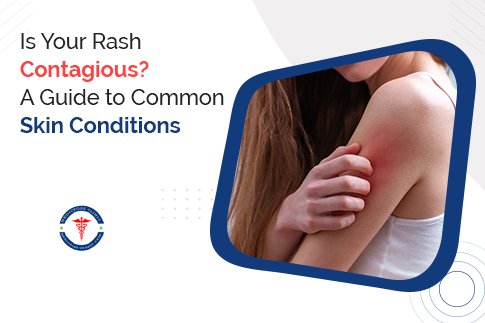Rashes can be scary. They can itch, burn, or make your skin red. Some rashes can spread to other people. Some do not. Here, we will help you know what to watch for and when to come see us at Medicross Clinic and Urgent Care.
What Is a Rash?
A rash is any part of the skin that looks or feels different. It might be red, bumpy, blistered, dry, or swollen. Rashes can come from allergies, bug bites, infections, or rubbing and heat.
Rashes That Can Spread
These rashes can pass from one person to another:
- Ringworm. It is a fungus that makes round red rings. It spreads by touching or sharing towels.
- Impetigo. A skin infection that makes yellow crusts. It spreads easily, especially in kids.
- Scabies. Small mites that tunnel beneath the skin, leading to severe itching. It spreads by close contact.
- Some viral rashes. Viruses like chickenpox can cause rashes that spread.
Rashes That Do Not Spread
Many rashes do not pass to others:
- Eczema. Skin gets dry and itchy. It is not from germs.
- Contact dermatitis. The skin reacts to something it touches, like soap or plants. It does not spread.
- Heat rash. Small bumps from sweat. Not contagious.
- Psoriasis. Thick, scaly patches that do not spread to other people.
Signs a Rash Might Be Contagious
Look for these signs:
- The rash appears in many people who were together.
- Blisters or pus that leak.
- Terrible itching after contact with someone who has a rash.
- A fever with a rash.
If you see any of these, avoid close contact and come to Medicross Clinic and Urgent Care.
When to Seek Care Right Away
Visit the urgent care in case any of the following occurs:
- Rash can be accompanied by fever, vomiting, or problems with breathing.
- It infects vast bodily parts in a short time.
- In the skin, there may be deep cuts, large blisters, or evidence of infection (redness, warmth, or oozing).
- A burn is enormous, highly painful, or contains white or dead skin.
- The rash is near the eyes, mouth, or private parts.
We are here to help. No appointment is needed.
How We Help At Medicross Clinic and Urgent Care
We look at the rash and ask simple questions, like when it started and if others have it. We can do tests if needed. Then we give the proper care. This may include:
- Creams or ointments for fungus or skin infections.
- Antibiotics for infections like impetigo.
- Medicine to treat scabies mites.
- Soothing creams and advice for eczema or contact rashes.
- Burn care and dressings for small to medium burns.
We explain how to care for the skin at home and help with follow-up if needed.
Easy Home Care Tips
These things help many rashes:
- Keep the area clean and dry.
- Avoid sharing towels, clothing, or bedding if the rash could be spread to others.
- Wash your hands often with soap and water.
- Try not to scratch. Use cool cloths or the medicine your clinician tells you to use.
- For burns, cool the area with running water for several minutes, then cover lightly and come see us if it is large or deep.
Why It Helps To See a Clinician
People often buy creams from the store. The wrong cream can make things worse. At Medicross Clinic and Urgent Care, we:
- Find the right cause so you get the right medicine.
- Stop treatments that could hurt your skin.
- Show you how to care for the rash so it heals faster.
- Offer follow-up care if it does not get better.
What to Expect When You Come In
Our team is kind and trained. You can walk in when you need us. We will look at the rash, tell you what it likely is, and give treatment or a plan. If more tests or a specialist are needed, we will help set that up.
How to Protect Kids and Family
Kids get rashes a lot. To keep everyone safer:
- Teach kids not to share towels, hats, or hairbrushes.
- Keep cuts and sores covered.
- Wash bedding and clothes for anyone with a contagious rash.
- Keep up with vaccinations that can stop some viral rashes.
Conclusion
A rash can be simple or profound. If you are not sure, don’t guess. Self-diagnosis can lead to the wrong treatment. Come to Medicross Clinic and Urgent Care. We will look, treat, and explain what to do next. No appointment is needed. Our team will help you feel better and keep others safe.
FAQs
Q. Will a store cream fix it?
Not always. The wrong cream can make things worse. A clinician can tell you the right medicine.
Q. Is my rash contagious?
Maybe. Some rashes are spread by touch or sharing things. It might be contagious if it has blisters, yellow crusts, or terrible itching.

